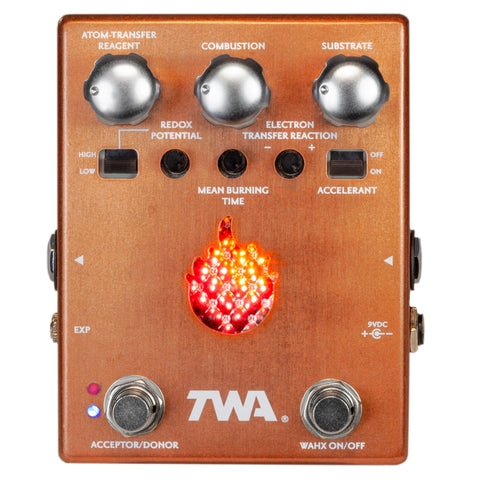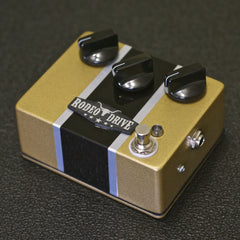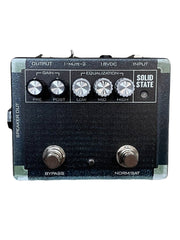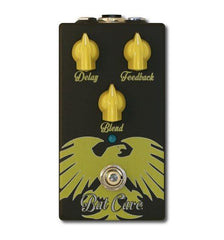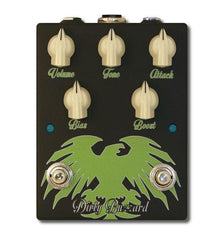Welcome To Steve's Music Center !
TWA WX-01 Wahxidizer
TWA
Sold out.
TWA WX-01 Wahxidizer
ENVELOPE-CONTROLLED FUZZ
- Fuzz circuit inspired by vintage Univox Super Fuzz
- Pronounced upper octave harmonic for Octavia/Ring-mod effects
- Level & Drive controls for Fuzz circuit
- Parametric EQ with Frequency select and Cut/Boost controls
- Envelope function allows control of EQ frequency via playing dynamics
- Threshold & Timing controls for envelope effect
- Footswitchable Fat/Scoop global EQ settings
- Expression pedal control of EQ frequency (Side Step compatible)
- Selectable low Gain & high Gain settings
- S3 “Shortest Send Switching” relay-based True Bypass
OCTAVES, FUZZES, FILTERS, WAHS—THAT’S THE STUFF WE LOVE, OH YEAH!!
Inspired by the vintage Univox Super Fuzz, the TWA WX-01 Wahxidizer™ captures the iconic, demonic tones of that legendary blue and orange monster while simultaneously reinventing its user interface and control capabilities.
All of the crazy, crunchy, cacophonous octave-fuzz tones of the Univox have been replicated with pinpoint accuracy.
The Fat/Scoop, global EQ switch from the Super Fuzz has been moved to a footswitch, allowing the user to access two completely different fuzz tones on the fly.
For additional tone tweaking, a Parametric EQ circuit has been added to allow for everything from precision fine-tuning to dramatic decomposition of the pedal’s EQ curve.
Better yet, the EQ’s center frequency can be swept three different ways – manually, by playing dynamics or by an external expression pedal. This feature effectively add an envelope-controlled filter to the Fuzz OR turns the pedal into a fuzz/wah/octave, depending on your control method of choice.
Caustic on Guitar, crushing on Bass, the Wahxidizer™ will turn your tone into a colossal, rusting hulk of expressive, explosive, and corrosive sound.
CONTROLS -
The control names of the Wahxidizer™ are taken from the scientific explanation of the oxidation process. Not only will your memory improve by recalling their functions, you will also become smarter by using this pedal!
SUBSTRATE (Level) – Controls output level of effect. Turn CW for more louder.
COMBUSTION (Drive) – Controls the amount of saturation for the Fuzz Effect. Turn clockwise for more dirt/gain/sustain/pain.
ATOM-TRANSFER REAGENT (Frequency) – Adjusts the frequency of the Parametric EQ from low (CCW) to high (CW).
REDOX POTENTIAL HIGH/LOW – Selects between two overall sensitivity settings for the envelope detection circuit to accommodate low and high signal levels.
REDOX POTENTIAL (Threshold) – Adjusts the Threshold setting where the input signal will trigger the envelope detection circuit. Turning CW makes it easier to open the filter.
MEAN BURNING TIME (Speed) – Adjusts the timing for envelope circuit to reach the peak of the filter range. Turn CW for a longer time to reach the filter peak.
ELECTRON TRANSFER REACTION (-/+) – Adjusts the amount of Cut (CCW) or Boost (CW) to the frequency selected by ATOM TRANSFER REAGENT.
ACCELERANT OFF/ON – Turns on envelope-detection circuit
ACCEPTOR/DONOR – Selects between Fat or Scoop Global EQ settings. Fat is full frequency response, while Scoop cuts the midrange.
WAHX ON/OFF – Engages/Disengages the effect.
EXP – Connect external expression pedal or TWA Side Step here to control Frequency of EQ.
LOW/HIGH GAIN – Internal mini switch selects between high or higher gain operation.
THE HISTORY –
The first thing I thought when I heard the Beastie Boys’ 1990’s classic “Gratitude” was – WHAT is that F’ing Fuzz pedal they are using on the BASS?!??
It wasn’t until years later that I ran across a photo of Adam Yauch’s Bass rig, which sported a vintage, blue and orange Super Fuzz as well as a DNA Bass Dragger (which we would eventually wind up distributing for a few years as well).
While many famous Guitarists used the Super Fuzz, it was its undeniably immense sound on Bass that got me hooked on this ancient audio artifact.
Fast forward a few decades to the twenty-teens, and let’s take a look at Maxon’s extremely under-appreciated Fuzz Elements series.
In 2013, Maxon Japan came to us with a project—they wanted to introduce a series of effects that replicated several of the most iconic vintage fuzz pedals. They had the circuit designs ready, but did not have any marketing plan for the series.
I came up with the “Fuzz Elements” concept, with the idea that there should be five fuzz pedals, one for each element—Earth, Air, Fire, Water, and Ether.
Maxon being - well, Maxon, they decided to add two additional models in the form of Void and Wind to further confuse things (not really elements, but let’s not split hairs).
All the Fuzz Elements models sounded great, but there were two that stood head and shoulders above the rest – Water and Ether. These models were designed to emulate the Triangle-Knob Big Muff and Super Fuzz respectively. However, each also had a Parametric EQ circuit with a selectable frequency that could be cut or boosted.
This EQ made these two pedals incredibly versatile, providing many additional, unique sounds beyond the trademark tones of the vintage archetypes they were designed to emulate.
The Fuzz Elements received critical acclaim, but for some unknown reason the sale never really took off. One writer who heaped praise on the Ether was Bass Player Magazine’s Jonathan Herrera. Jon suggested that the pedal would be even cooler if the EQ frequency could be swept via an expression pedal.
We took that idea and ran with it, thinking “How about envelope control of the frequency as well?” We then added a few other “what-if”’s to our wish-list and kicked the concept over to our engineer along with an Ether pedal to be Frankenstein’d into our dream device.
Once he designed an envelope detection circuit, the rest of the pedal came together fairly easily. In fact, we’ve had a prototype of the Wahxidizer™ knocking around since 2017, but in 2018 we put the brakes on TWA for a bit to focus on the Maxon Custom Shop.
Pandemics also have a pesky habit of getting in the way of EVERYTHING, including pedal releases. Now that the worst of things (as well as Maxon) are in the rear-view, we’ve decided to finally get the Wahxidizer™ out into the world while there’s still a world to get it out into.
We hope you dig this combustible contraption as much as we’ve enjoyed creating it.
Wahx On, because rust never sleeps!
